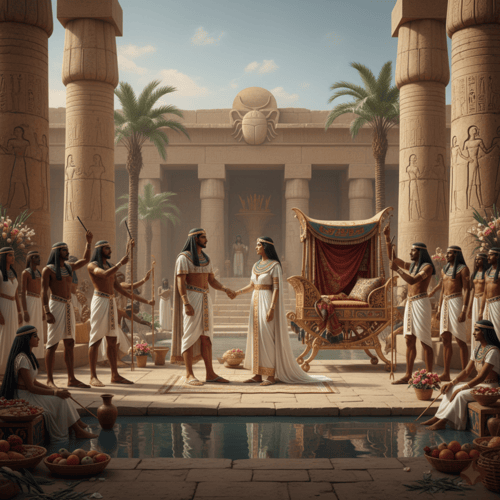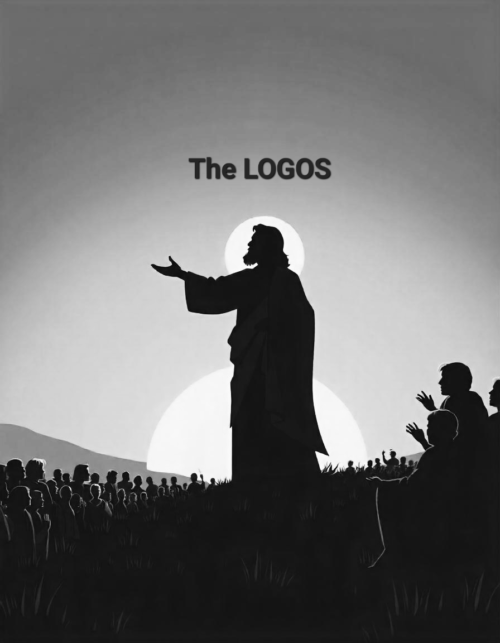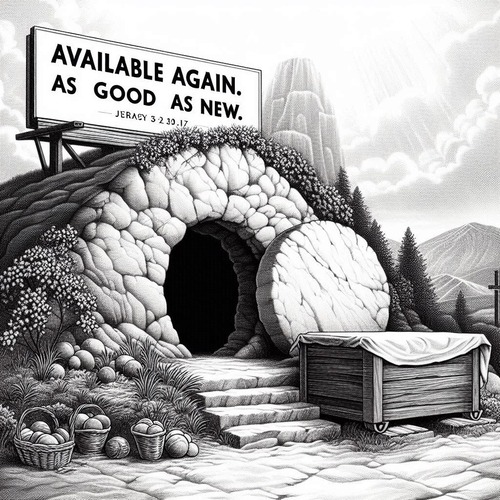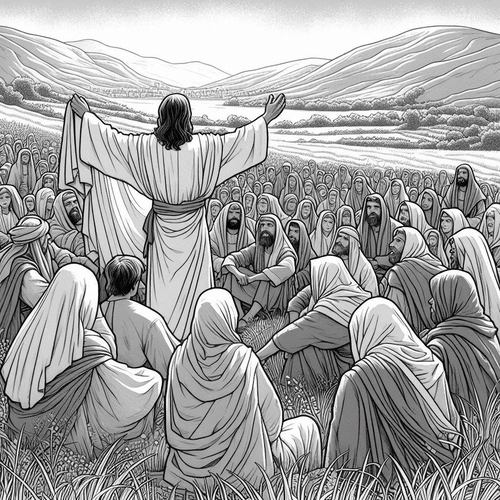The Logos: Why Does John Call Jesus the Word?
“In the beginning was the Word, and the Word was with God, and the Word was God” (John 1:1). The Apostle John opens his Gospel account with these words. In so doing, He introduces one of the most philosophically rich and theologically significant concepts in Scripture: Jesus Christ as the divine Word, or the LOGOS. This declaration has shaped our understanding of Christ’s nature and role for two millennia, particularly within Reformed theology. But why does John choose this specific title for Jesus, and what depths of meaning does it convey?
THE LOGOS: THE HISTORICAL AND PHILOSOPHICAL CONTEXT
To fully grasp John’s revolutionary declaration, we must first understand the intellectual world into which he wrote. The Greek concept of Logos had a rich history in philosophical thought. Heraclitus first proposed the Logos as the fundamental organising principle of the universe, while Stoic philosophers developed this into the concept of divine reason that permeates all of reality. Meanwhile, Philo of Alexandria attempted to synthesise Greek philosophical concepts with Jewish theology, describing the Logos as an intermediary between God and creation.
The Old Testament Foundations
However, John’s use of Logos drew even more deeply from Old Testament foundations.
- God’s Creative Speech in Genesis 1: The pattern of “And God said…” followed by creation coming into being establishes God’s word as having inherent creative power. This shows that God’s word is not merely communicative but actively brings reality into existence.
- The Personification of Divine Wisdom in Proverbs 8: Wisdom is portrayed as a divine person present with God before creation, delighting in His work and participating in the ordering of the universe. This personification provides a crucial bridge to understanding how the Word could be both with God and be God.
- Creation Through Divine Speech (Psalm 33:6-9): “By the word of the LORD the heavens were made” explicitly connects God’s creative power with His spoken word. This psalm reinforces Genesis 1 by showing that God’s word carries within itself the power to accomplish His purposes.
- The Prophetic Formula: The recurring phrase “the word of the LORD came to…” throughout the prophetic books demonstrates that God’s word is dynamic and personal, actively engaging with human beings. This shows the word as more than abstract communication—it’s a divine force that encounters people.
- Divine Word as Active Agent (Isaiah 55:10-11): God declares that His word “shall not return to me empty, but it shall accomplish that which I purpose.” This portrays the word as an extension of God Himself—carrying His authority and always achieving its intended effect.
- Wisdom Literature’s Living Word: Throughout Psalms and Proverbs, God’s word is described as “living,” “active,” and “powerful.” These descriptions paint a picture of the word as having qualities of personhood—it guides, teaches, and transforms.
- Word as Covenant Mediator: Throughout the Old Testament, God’s word serves as the means by which He establishes and maintains covenant relationships with His people, foreshadowing Christ’s role as the living Word and ultimate covenant mediator.
JOHN’S THEOLOGICAL INNOVATION
John takes these rich traditions and transforms them through divine inspiration into something radically new. His Logos is not an impersonal force or philosophical principle, but a divine Person who is both distinct from and identical with God. “The Word was with God” speaks to this distinction, while “the Word was God” affirms complete deity. This Word is the agent of creation: “All things were made through him, and without him was not anything made that was made” (John 1:3).
Most astoundingly, the eternal Word “became flesh and dwelt among us” (John 1:14). The Greek philosophical tradition could never have conceived of the Logos taking on human nature. Yet John declares that the eternal, creative Word entered into His own creation, making the invisible God visible. “No one has ever seen God; the only God, who is at the Father’s side, he has made him known” (John 1:18).
REFORMED THEOLOGICAL IMPLICATIONS
The Reformed tradition has particularly emphasised the significance of Christ as the Word. This doctrine underlies our understanding of Christ’s divine nature, affirming His eternal generation from the Father while maintaining His full equality in substance. As Calvin noted, the title “Word” speaks to Christ’s essential role as mediator—He is the one through whom God fully and finally reveals Himself to humanity.
This has profound implications for our understanding of Scripture. The written Word bears witness to the incarnate Word, and both are essential for true knowledge of God. As the Westminster Confession states, Christ is the sum and substance of all biblical revelation. Every promise, prophecy, and provision in Scripture finds its fulfillment in Him.
The Word’s role extends beyond revelation to redemption. As the eternal Word become flesh, Christ bridges the infinite gap between Creator and creature. He not only speaks God’s truth but embodies it, not only conveys God’s love but demonstrates it through His sacrificial death and triumphant resurrection.
Contemporary Application
Understanding Jesus as the Word reshapes our entire approach to the Christian life. It means we cannot truly know God apart from Christ, for He is God’s perfect self-expression. It means Christ’s authority is absolute, for He speaks with the very voice of God. It means our worship must be centred on Christ, for in Him alone do we encounter the fullness of deity in bodily form (Colossians 2:9).
Moreover, this doctrine profoundly impacts our approach to Scripture. We read the Bible not merely to gain information about God but to encounter the living Word Himself. As Calvin observed, the Scripture is the “spectacles” through which we properly see Christ, who is Himself the perfect image and Word of God.
CONCLUSION
John’s identification of Jesus as the Word is one of the most brilliant theological moves in Scripture. It communicates Christ’s deity, His role in creation and revelation, and His unique capacity to make God known to us. For believers today, it reminds us our faith isn’t merely in a set of propositions but in a Person—the eternal Word who became flesh for our salvation.
This truth calls us to more than intellectual assent. It demands our complete submission to Christ as the authoritative Word of God and our wholehearted worship of Him who is the perfect expression of God’s nature and purpose. In knowing Christ the Word, we know God Himself, for “whoever has seen me has seen the Father” (John 14:9).
As we contemplate this profound truth, may we echo the words of Peter: “Lord, to whom shall we go? You have the words of eternal life” (John 6:68). For in Jesus, the eternal Word made flesh, we find all that we need for life and godliness, all the treasures of wisdom and knowledge, and the very power of God for salvation.
THE LOGOS: RELATED FAQs
Did Ancient Egyptian concepts potentially influence John’s use of the Logos? The Egyptian concept of “Hu”—the divine word or utterance—was believed to have creative power and was personified as a god. Some scholars suggest this may have influenced Alexandrian Jewish thought, particularly through Philo, creating part of the cultural backdrop against which John wrote his Gospel. However, John’s presentation of the Logos as both personal and incarnate was radically different from the Egyptian concept.
- What role did the Targums play in developing Jewish understanding of the “Word”? The Targums (Aramaic translations/paraphrases of Hebrew Scripture) often used the phrase Memra (Word) to describe God’s interactions with the world, avoiding anthropomorphic descriptions of God. This concept of the Memra as God’s active presence may have helped early Jewish Christians understand John’s identification of Jesus as the Word. The Targums frequently used “Memra” in contexts where the Hebrew described direct divine intervention, suggesting a developed theology of divine mediation through the Word.
- How did early Church Fathers like Justin Martyr use the Logos concept in apologetics? Justin Martyr used the Logos doctrine to engage with Greek philosophers, arguing that the “seeds of the Logos” (logos spermatikos) were present in all human reasoning but fully embodied in Christ. This allowed him to claim that whatever truth existed in Greek philosophy was a partial reflection of Christ the Logos, while maintaining Christianity’s uniqueness. His approach became a model for Christian engagement with other philosophical traditions.
What’s the connection between the Logos and the Jewish concept of Divine Wisdom (Hochmah)? Jewish wisdom literature, particularly in the intertestamental period, developed an increasingly personified concept of Divine Wisdom that shared many attributes later associated with the Logos. The Book of Wisdom (while not canonical for Protestants) even describes Wisdom as God’s agent in creation, a perfect image of God’s goodness, and the one who renews all things. These parallels suggest John may have been drawing on and transforming this wisdom tradition.
- How did the Logos doctrine influence early Christian art and symbolism? Early Christian art often represented the Logos-Christ using the symbol of a scroll or book, emphasising His role as divine revelation. The Chi-Rho symbol, combining the first two letters of “Christos” in Greek, was also associated with the Logos doctrine, representing Christ as the divine Word through whom all things were ordered. These artistic representations helped communicate complex theological concepts to a largely illiterate early church.
- What role did the Logos doctrine play in the development of Christian monasticism? The concept of Christ as the divine Word significantly influenced monastic practices of lectio divina (divine reading) and contemplative prayer. Early monastics saw their meditation on Scripture as direct engagement with the Logos, believing that since Christ was the Word, deep contemplation of biblical texts was a means of intimate communion with Him. This understanding shaped monastic spirituality for centuries.
How did medieval Islamic philosophers engage with the Christian concept of the Logos? Medieval Islamic philosophers like Al-Farabi and Ibn Sina (Avicenna) engaged with the Logos concept through Greek philosophical sources, developing their own theories about divine intellect and creative word. While rejecting the Christian doctrine of incarnation, they found the philosophical framework of the Logos useful for explaining divine creativity and revelation. This even led to interfaith philosophical dialogues in medieval Spain and the Middle East.
THE LOGOS: OUR RELATED POSTS
Editor's Pick

Born Broken: Why Must We Affirm Original Sin?
Imagine a world where we’re born neutral—free to choose good, and without a bias toward evil. Sounds appealing… until we [...]

Does God Truly Care About My Everyday Choices?
We believe God created the universe. We believe He orchestrated the exodus from Egypt and raised Jesus from the dead. [...]

Did Joseph Sin in Marrying an Egyptian?
It’s a troubling question: if God forbade His people from foreign alliances, why was Joseph’s marriage to an Egyptian not [...]
SUPPORT US:
Feel the Holy Spirit's gentle nudge to partner with us?
Donate Online:
Account Name: TRUTHS TO DIE FOR FOUNDATION
Account Number: 10243565459
Bank IFSC: IDFB0043391
Bank Name: IDFC FIRST BANK






